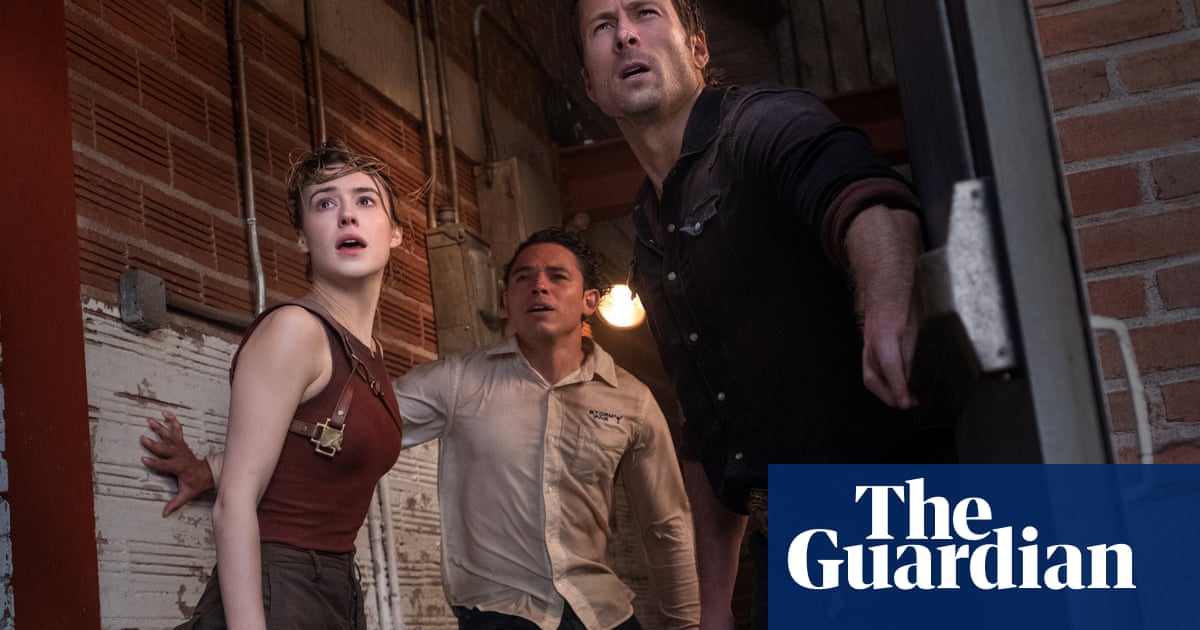- cross-posted to:
- [email protected]
- cross-posted to:
- [email protected]
A rodeo crowd waves cowboy hats as a man rides a bucking horse. Then comes a shower of leaves, a chorus of mobile phone rings and a wail of klaxons. Horses run wild and cars collide. One vehicle is whipped into the air by what a weatherman calls a once-in-a-generation tornado outbreak.
This is a scene from Twisters, starring Glen Powell and Daisy Edgar-Jones, in which rivals come together to try to predict and possibly tame ferocious storms in central Oklahoma. A sequel to the hit disaster movie Twister from 1996, it is a Hollywood summer blockbuster designed to entertain – but also a lost opportunity to raise awareness of the climate crisis.
“I just wanted to make sure that with the movie, we don’t ever feel like [it] is putting forward any message,” director Lee Isaac Chung, who grew up in Oklahoma’s tornado belt, told CNN. “I just don’t feel like films are meant to be message-oriented.”
That may not come as a surprise to scientists and climate activists. Despite global heating’s existential threat to humanity, and despite Hollywood’s left-leaning tendencies, the subject rarely makes it to the big screen.
A study published by the nonprofit consultancy Good Energy and Colby College’s Buck Lab for Climate and Environment analysed whether the climate crisis was present in 250 of the top-grossing fictional films between 2013 and 2022. In only 32 of the films (12.8%) was it clear that climate change exists, and in only 24 of them (9.6%) was it clear that a character knows it.
“I just wanted to make sure that with the movie, we don’t ever feel like [it] is putting forward any message,” director Lee Isaac Chung, who grew up in Oklahoma’s tornado belt, told CNN. “I just don’t feel like films are meant to be message-oriented.”
Has the whiff of cowardice about it.
Looks at every film ever made - and then every other piece of media
If media isn’t supposed to have a message, what the hell has he been watching/reading?
It’s newspeak for “I don’t want messages that I disgree with in my media.”
Just like when conservatives complain about something being “political” they mean “progressive” and by progressive I mean “they saw a minority.”
It’s a way of saying something without saying it.
Oh yeah, sorry a bit of tongue in cheek sarcasm there. We all know films have always had messages, storytelling has always had a message. It’s just they had a weather disaster movie and now (and going forward) it’s going to be pretty much impossible for hollywood to avoid climate change when doing a weather disaster story.
Not wrong, but poor dude probably just wants to get hired to make another movie someday.
As I said elsewhere, I think in reply to you again Emperor 😁, Twisters mentions there are more tornados than ever and its the worst they’ve ever seen.
I can’t remember them mentioning if it has been getting worse year after year, but to me, it feels like they almost want to mention climate change but not cross the line.
Despite that, it is two hours of wonderful entertainment. Wasn’t expecting that from a legacy sequel!
Hollywood used to be concerned about climate change awareness, and we could hear superstars actors making poignant speeches about it.
Then they figured that being serious about it meant stop flying private jets and helicopters, stop over consuming by building 4 mansions for themselves and collecting cars and what not, and it became a sensitive topic.
Climate change is something most people are willing to fight for only if the solution is OTHERS will have to make changes.
We got a ton of disaster movies made 10+ years ago, to name a few:
- Contagion
- Day After Tomorrow
- The Wave
- The Impossible
- San Andreas
- 2012
- …
And around the same time we got a bunch of dystopian movies, so it’s not like Hollywood haven’t shown what can happen.
I don’t think they want to make movies about current events, instead I think we get more movies about how humans will live years after a global disaster.
Don’t Look Up was meant to be about climate change. But its depiction of tribalism and news media psyops was so good that everyone assumed it was about COVID, which had happened after the movie wrapped filming but before it released. If it had come out a couple years earlier the message would have been clearer, but then people also probably wouldn’t have resonated with it as much because most people don’t care as much about climate change as they did about the pandemic one way or the other at that key time.
Wait… People don’t realise that don’t look yo is obviously about climate change!?
Keep in mind it came out right around the same time that the first COVID vaccines were becoming widely available and the antivaxxer movement was kicking into maximum wackadoo mode.
Less than a month after DLU came out was when antivaxxer assholes from all over Canada drove to Ottawa to terrorize the citizens of the city in order to try and strongarm the federal government into getting rid of any vaccine and masking mandates
Yeah, of course science denial is science denial. There is going to be major thematic links…
But it’s so blatantly obviously climate is the primary focus there.
Arent all of these like… At least 14/15 years old now.
10+ has that covered.
Yep, they are about half way to be rebooted. Except 2012 I can’t think of a good way of rebooting it without changing the title.
2012 2? This time is personal…
2024!
That’s too “on the nose”…
Every warning produced by artists ends up being a How To manual for fascists, so idk if it’s a good idea to continue, especially since the messages are lost on the masses.
I do not think Don’t Look Up was scared of anything.
Don’t look up was a pretty good lambasting of the worst of Americans…
This is the best summary I could come up with:
Starring Leonardo DiCaprio, Jennifer Lawrence, Meryl Streep and Cate Blanchett, the film memorably depicted TV hosts consumed by trivia rather than the extinction event – a stark warning about humanity’s ongoing insouciance as the planet burns.
Alice Hill, a senior fellow for energy and the environment at the Council on Foreign Relations thinktank in Washington, says: “Climate change affects everything so it’s a piece of any story that we tell, but it also can be anxiety-provoking and depressing for people.
Twenty years after its release, Roland Emmerich’s summer blockbuster The Day After Tomorrow, starring Dennis Quaid and Jake Gyllenhaal, still stands alone as a classic disaster movie that explicitly attributes its litany of death and destruction to the greenhouse effect.
David Lipsky, author of The Parrot and the Igloo: Climate and the Science of Denial, says by phone from New York: “At the time, it was seen as ridiculous and the kind of mistake Hollywood makes that actually turns the audience off of this as a serious issue.
Joshua Glick, visiting associate professor of film and electronic arts at Bard College in Annandale-on-Hudson, New York, says: “There has always been an affinity between the blockbuster as mode or practice of film-making and natural disaster plots.
“Individual episodes within ongoing series, movies, books, short videos – there’s just so much opportunity to tell compelling stories that people can see themselves in, that they can relate to and identify with, not just in terms of being put at risk from the harms of climate change but also that they can see themselves and what solutions look like.”
The original article contains 1,780 words, the summary contains 265 words. Saved 85%. I’m a bot and I’m open source!
I thought the Tomorrow War was super clear.







